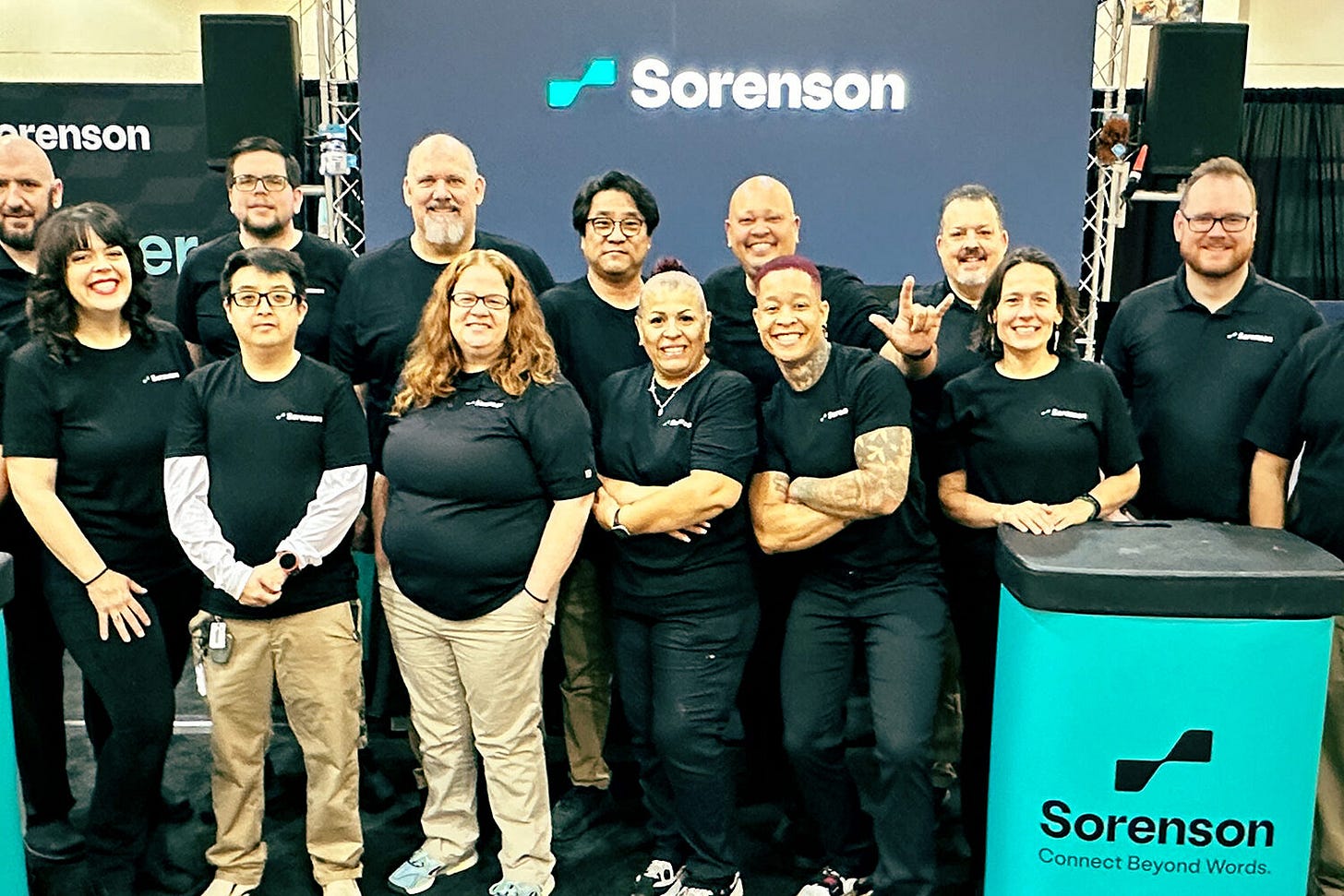Ariel Investments union busting ways were discussed at the Chicago Teachers’ Pension Fund March 20, 2025 meeting.
Jim Baker, the executive director of the Private Equity Stakeholder Project, a private equity watchdog group, spoke during the public participation period about the problem with Ariel Management, a controversial private equity group with strong connections to the Chicago Machine. He said Sorenson Communications, which is owned by Ariel, is trying to prevent the workers who are sign language interpreters for the deaf community from forming a union. He said the workers have been complaining for a long time about poor working conditions and they have asked for better regulations.
“We have raised this with Ariel multiple times starting last year and they have thus far refused to meet,” Baker told the Trustees. “We would ask that the Chicago Teachers’ Pension Fund scrutinize whether Ariel and Sorenson’s actions might run afoul of the responsible investment policies that Ariel has put forward and ask that the Chicago Teachers Pension Fund meet with sign language interpreters.”
Marissa Lewis, an ASL interpreter, spoke next during public participation and said the Chicago Teachers’ Pension Fund has $80 million invested in Ariel that owns Sorenson Communications. She said a lot of workers are leaving the company because there is abuse and they feel gaslit and isolated by management’s attempt to keep them separated. The company also fails to provide adequate service to the deaf, blind, and hard of hearing communities.
“We’re asking CTPF to engage with Ariel and help us win our union,” Lewis said. “We want a card check neutrality agreement that will allow us to organize free of management’s interference.”
Teacher Trustee Paula Barajas then asked to speak not as a trustee, but a member of the public on the issue. While she sat down at the table facing the trustees, CTPF President Jeffery Blackwell said, “Once you go to that side you can’t come back.” Several trustees laughed at this statement.
“I would like us as a Pension Fund to meet with Ariel,” Barajas said. “I am a little worried and disturbed what’s happening with Ariel and Sorenson. Thank you so much.”
This is the first time I have seen a trustee from the Teachers Pension Fund speak as a member of the public and not a trustee. This happens in other meetings, such as the Chicago Teachers Union House of Delegates meetings, where once in a while an officer can go to the mic reserved for delegates to speak on a topic that they are either for or against.
Retired Teacher Trustee Maria J Rodriguez supported Paula’s decision to speak during public participation. Maria said she used to also speak when she was a trustee during public speaking, but things changed and she was not allowed to do so. She said she wanted clarification about the policy of allowing trustees to speak as a citizen and not a trustee.
Blackwell asked a lawyer to explain the policy and the lawyer said the trustee steps away as a trustee and speaks as an individual and must identify themself as an individual with a concern. The attorney said Trustee Rodriguez was correct that we should finetune the process, including signing up on a public speaking request.
Trustee Mary Sharon Reilly questioned whether trustees should be advocating for union groups. “Is it appropriate for us to even do that?”
Ariel is a very controversial private equity group based in Chicago that has been doing business with Chicago Teachers and other city pension funds for years despite dismal results. They have been on the CTPF Watchlist for money managers for many years, and they narrowly won a 5-4 vote to continue investing teachers’ pension money despite their poor performance.
The other concern about Ariel has been its close ties to union busting. Ariel Investments Co-CEO is Mellody Hobson, the former chair of the board of directors of Starbucks, which has engaged in a long and ugly union busting fight with its workers, prompting U.S. Senator Bernie Sanders to say, “Starbucks has waged the most aggressive and illegal union-busting campaign in the modern history of our country.”
The question of private equity should also be a concern for workers and their pension funds. Private equity companies are notorious for buying up companies and cutting workers, and destroying their pension and health benefits, while evading environmental and health protections.
As a fiduciary, CTPF Trustees should question the need to invest with private equity companies that charge sky-high fees and secret agreements in which the trustees don’t even know how much money is being drained away into PE accounts at the expansion of the Pension Funds.
It appears certain money managers are close to certain trustees. VP Jacquelyn Price Ward, who voted to continue investing with Ariel last year, spoke up for the company at the end of the meeting. During the new business period, she said Ariel earned 8.8 percent net of fees, and for 12 months 12.83 percent net of fees. “They knocked it out of the park,” Price Ward said. “This is really great on returns, we don’t see this a lot. I wanted to bring special attention to this.”
Former Teacher Trustee Tina Padilla, the director of the Pension Advocacy Group (PAG), is a perennial speaker at the Pension Board meetings. She said the Fund’s mission is to leverage the strength of CTPF members and research and organize to restore and protect the defined benefit plan, the gold standard. She said it is important to restore the funding level to 100 percent (currently it is about 48 percent). She said the goal is to decrease the operating expense ratio and increase the funded ratio.
“This way we can show our legislators that we are good stewards of our retirement savings,” she said. “How else can we convince our legislators that Tier 2 should be repealed.”
However, CTPF Carlton Lenoir poured cold if not freezing water all over this suggestion later in the meeting during his presentation. Lenoir said while it is important to attract the best to teach in Chicago Public Schools, they have a fiduciary responsibility.
“Some of the public participation we’ve been seeing (is) to eliminate the Tier 2,” he said. “All current and former Trustees understand that their fiduciary duties prohibit actions that could negatively impact our fund … We recognize that these responsibilities can be challenging. For example, when you have competing concerns of fairness and equity to attract the best and the brightest to the Chicago Public Schools, on the one hand, with our fiduciary responsibility to the financial stability of the fund, on the other. The reality we must face to eliminate Tier 2 or some other Tier like 1 benefit would result in a substantial benefit cost that would increase costs and decrease our already low funding level. So as fiduciaries of the fund we cannot advocate for such legislation.”
Lenoir said it is the role of our labor organizations to advocate in the state legislature to fix the Tier 2 problem, which is a far diminished pension for state workers like teachers hired after 2011 who must work until age 67.
“I hope that brings some clarity to this point because I know it’s been raised at several meetings.”
May 15 is the next meeting because there is no scheduled board meeting in April.




